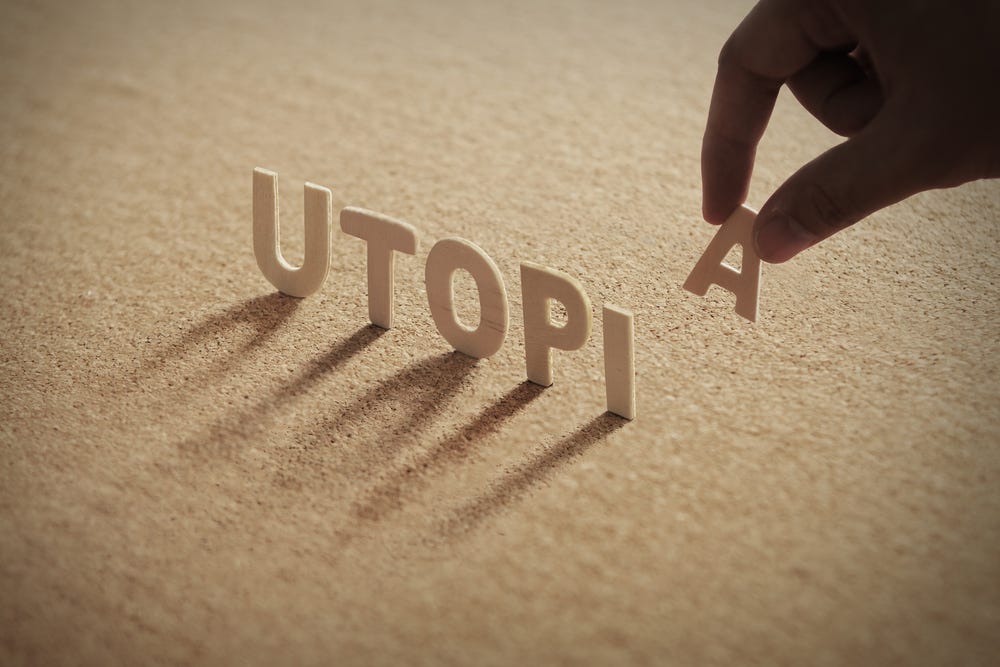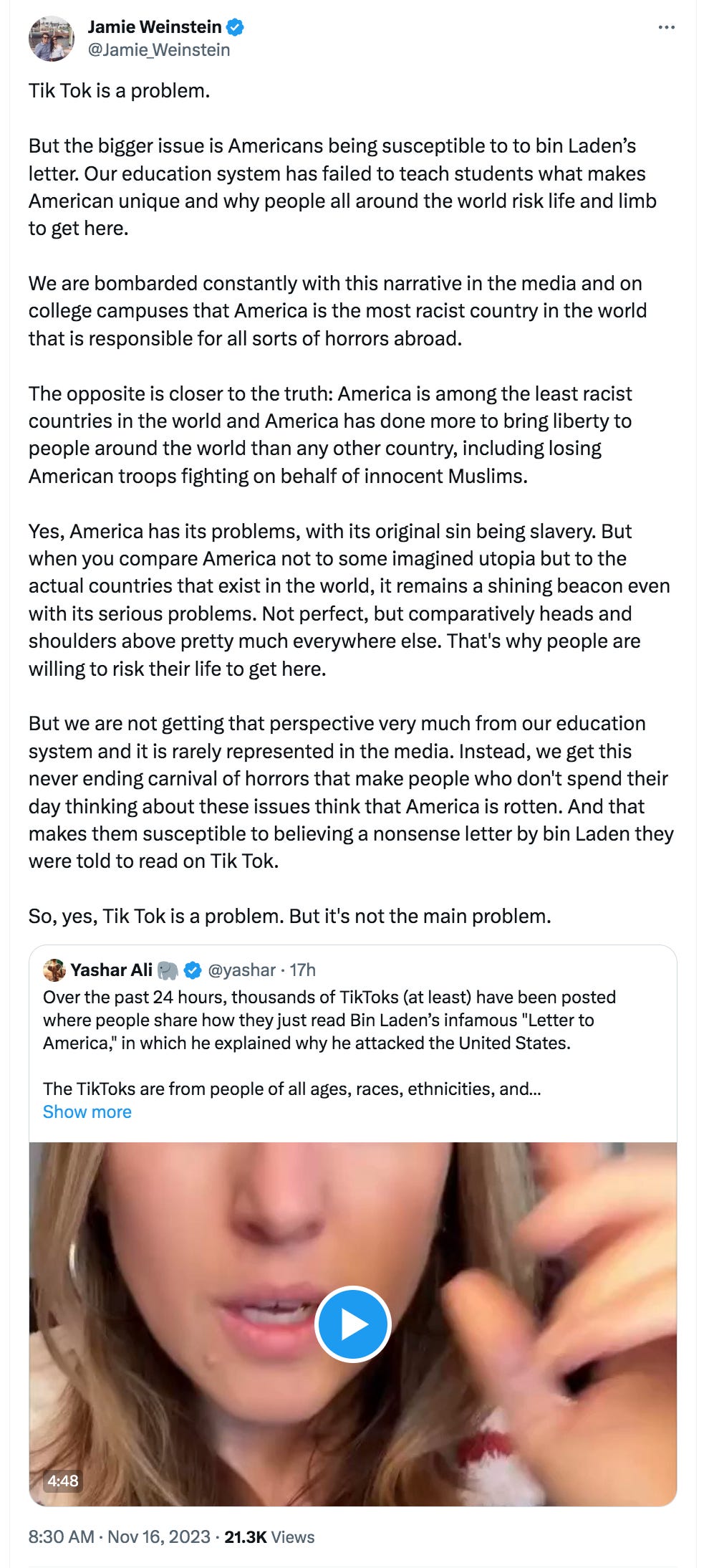E-Pluribus | November 16, 2023
Illiberal progressives; humanitarian utopians; and anti-racist physicians.
A round-up of the latest and best musings on the rise of illiberalism in the public discourse:
Pamela Paul: Progressives Aren’t Liberal
It may seem like progressives are just rebranded liberals, but the situation is more complicated, says Pamela Paul. In her latest New York Times newsletter, Paul argues that, to an increasing degree, modern progressives are actually moving in the wrong direction when it comes to the traditional liberal vision.
For those of us who never abandoned the term [liberal] — why let Republicans define us? — liberal values, many of them products of the Enlightenment, include individual liberty, freedom of speech, scientific inquiry, separation of church and state, due process, racial equality, women’s rights, human rights and democracy.
Unlike “classical liberals” (i.e., usually conservatives), liberals do not see government as the problem, but as a means to help the people it serves. Liberals fiercely defend Social Security, Medicare, Medicaid, Obamacare, the Voting Rights Act and the National Labor Relations Act. They believe government has a duty to regulate commerce for the benefit of its citizens. They tend to be suspicious of large corporations and their tendency to thwart the interests of workers and consumers.
As recently as the 2000s, the difference between liberals and progressives was often a matter of degree — Obamacare versus Medicare for All, or increasing the top marginal tax rate versus imposing a wealth tax. But while liberalism’s most strenuous threat comes from the Trumpian right, a split over basic principles and the purpose of the left has been widening.
In an increasingly prominent version of the progressive vision, capitalism isn’t something to be regulated or balanced, but is itself the problem. White supremacy doesn’t describe an extremist fringe of racists and antisemites but is instead the inherent character of the nation.
Some aspects of contemporary progressivism look less like actual progress and more like a step in reverse. Whereas liberals hold to a vision of racial integration, progressives have increasingly supported forms of racial distinction and separation, and demanded equity in outcome rather than equality of opportunity. Whereas most liberals want to advance equality between the sexes, many progressives seem fixated on reframing gender stereotypes as “gender identity” and denying sex differences wherever they confer rights or protections expressly for women. And whereas liberals tend to aspire toward a universalist ideal, in which diverse people come together across shared interests, progressives seem increasingly wedded to an identitarian approach that emphasizes tribalism over the attainment of common ground.
Read it all.
Ronald W. Dworkin: The Radical Humanitarian Doctrine
In a similar vein, Ronald Dworkin of George Washington University writes at Quillette that self-styled humanitarians are on a misguided, utopian quest to eliminate suffering. The problem? Their pilgrimage ultimately “leads not to utopia but to barbarism.”
Today, many religious-based activists in the US preach humanitarian love. Although they may love their neighbor, they love all humanity more emphatically still. One activist minister declared her intention to improve society on a national and even global scale, arguing, “We’re modeling the kind of country and the kind of world that we wanna live in.” Rather than engage in concrete personal acts of love, from person to person, humanitarians engage in abstract impersonal acts of love, from activist to humanity. Rather than make immediate spiritual connections with real people, they support institutions of general welfare. They think on the scale of the human species and focus attention on what every human being shares in: the ability to suffer. This affects policy.
For example, traditional Christians and Jews believe in mercy, but mercy does not mean excusing a criminal’s behavior. Humanitarian love, in contrast, demands that no one suffer, which gives rise to a new attitude toward criminal behavior. Of the criminal who steals from a department store or who pushes someone off the subway, religious humanitarians say, “He is only human” or “We’re all human” or “He, too, suffers.” A man who is nothing and has nothing is “still a human being,” they argue. According to humanitarians, the criminal should not be allowed to suffer because it is too painful to watch anyone suffer. Besides, a negative judgment on the criminal might one day lead to a negative judgment on themselves, making them suffer in turn. Suffering is everywhere! Hence the movement among today’s humanitarians to be more forgiving toward crime, predicated on an insistence that “to err is human.” Criminal behavior arises, they declare, not because the criminal is bad so much as because “there is not enough love in the world.”
To prevent suffering, humanitarian love also attacks the principle of merit. So focused are humanitarians on the lowest common denominator of human existence—suffering—and so worried are they about unsuccessful people feeling embarrassment, that humanitarians try to minimize merit. They get rid of admissions standards in exclusive high schools and colleges. They dumb down tests so that everyone passes and no one has to cope with the shame of failure. They encourage the hiring of people who may have less merit but who have a stronger history of suffering. In the world of humanitarian love, failure is “excused.” To do so is to be “understanding.” This is said to be the “humane” attitude.
Paradoxically, such extreme sensitivity toward suffering goes hand in hand with radical and even violent protest movements. For many radical humanitarians, suffering is the only reality. They demand that all social conventions be overturned, ranging from traditional family organization to the existence of police departments. They declare that society itself is nothing but a fabric of spells and charms. They say people wrongly listen to their parents, wrongly try to be masculine or feminine, wrongly want to win, and wrongly pay for things. Each of these illusions causes people to suffer, they say, yet they are woven into people’s lives with bonds so numerous that no one any longer knows their origins. “What is more empty than a convention? Why respect it?” they cry.
Their protest against conventions soon turns into a protest against every organized society, for every organized society has conventions. To end all suffering, radicalized humanitarians take it upon themselves to imagine life outside the current of society, and to protest until the last harmful convention has been destroyed.
Read the whole thing.
Dakota Powell: Doctors should practice ‘anti-racist documentation,’ paper argues
Dakota Powell covers the proposed woke-ification of medical documentation for the College Fix, highlighting a recent New England Journal of Medicine paper. To help eliminate disparate outcomes in medical care, the article claims, doctors must avoid the “mythology” related to their “patients’ racial identities.”
Dr. J. Corey Willams, a graduate of Johns Hopkins School of Medicine and the Yale University Psychiatry Residency Program, says that “Clinicians receive inconsistent instruction on how to use patients’ racial identities in clinical documentation and decision making, and often document this information without clear reasons or an understanding of its relevance.”
“Routine documentation of racial categories is rooted in the mythology of inherent biological differences between racial groups, especially between Black and non-Hispanic White people,” he wrote in the New England Journal of Medicine paper. He had eight other co-authors.
[. . .]
“Depending on how racial identity is employed and contextualized in the (patients’) chart, clinicians may perpetuate the codification of racial disparities in service delivery, teaching trainees racist ideas and communicating biases to other clinicians,” Williams wrote.
Dr. Williams recommends “[a]dopting documentation practices that encourage antiracism,” which he defines as “the active process of identifying and dismantling racism using measures that produce or sustain equity among racial groups, including changing organizational structures, policies, practices, and attitudes.”
“We advocate not for more documentation, but for more thoughtful documentation, based on a critical awareness of how race is used and contextualized as a social and political category,” he wrote along with his co-authors.
The practices involve questioning the relevance of the patient’s race, allowing the patient self-identification, considering the patient’s experience with racism, and others.
[. . .]
Ian Kingsbury, director of research for Do No Harm, told The Fix that implementing the changes in documentation “threatens to increase of the paperwork burden on doctors,” by asking them to provide their experience with racism and racial discrimination.
“There is good evidence that paperwork burdens contribute to doctor burnout and dissatisfaction,” Kingsbury said via email. “Policies that would exacerbate this problem are ill-advised.”
“The best way to understand a person is by talking to them as a human being and not part of an identity group. The woke rituals for which these researchers advocate only undermine doctor-patient relationships,” he said.
Read it all here.
Around Twitter (X)
The Massachusetts Institute of Technology (MIT) Free Speech Alliance says that students’ rights to free expression are not unfettered:
A recent tweet from Yashar Ali highlighted the disturbing rehabilitation of Osama bin Laden on TikTok. However, Jamie Weinstein says the issue goes deeper than a single social media platform:
And finally, for their part, TikTok is shocked - shocked! - to find its platform being used in a manner such as this:









